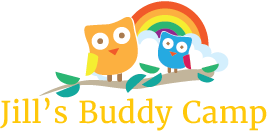
Who benefits from JBC? Everyone.
Preschool Campers
Highly “at-risk” preschool children. Campers receive 20 hours of developmental stimulation in language, pre-reading, fine and gross motor, social/emotional development, music, and art. Campers build personal connections and trust with a teenage Buddy, overcoming challenges together. The pair adventure on five experiential field trips, giving time for Buddies and Campers to gain new insights and opportunities for communication and growth. All this is accomplished in one (20-hour) week at Jill’s Buddy Camp!
Teenage Buddies
Teenage Buddies explore being a teacher or a learning encourager to a developmentally delayed or at-risk child. They observe exemplary professional educators and therapists applying their trade skills with preschool campers. Buddies learn essential parenting skills, patience, and how to give their best efforts to a young child in need. By volunteering 20+ hours, Buddies may fulfill the volunteerism/community service hours required by their high school's National Honor Society, Beta Club, Scout program, and/or the Service Learning Requirement for rising seniors, which all 12th-grade students require to graduate from a Virginia public school.
Parents and Caregivers
Parents witness their child’s joy, laughter, and growth after attending an intensive, free, week-long camp (some in a school setting for the first time). This stimulating camp is perfect for a parent’s developmentally delayed preschool child whose I.E.P. Committee IS NOT offering Extended School Year (ESY) services to their child over the summer. With their child spending over 20+ hours in Jill’s Buddy Camp with a new teenager (Buddy), many of these Buddies are recruited by parents to be a trusted new “sitter,” caregiving in the future for their child after camp is over.
School Systems
Jill’s Buddy Camp offers the opportunity for up to 25 highly “at-risk “4-5-year-old children who are anticipating entering Kindergarten in the Fall. This model creates a stimulating summer camp to pair a personal guide to introduce new learners to the school environment for the first time. School divisions may offer a Jill’s Buddy Camp to developmentally delayed preschoolers who do not qualify for Extended School Year(ESY) services. In parallel, it may serve as one of the weeks of intense stimulation for ESY services recommended by a developmentally delayed child's I.E.P. Committee. As a secondary benefit, a school division can annually cultivate student Buddies who want to go into special education or child therapy training programs in college with the dual benefit of recruiting future professionals who return to their school system as employees. For example, Salem City Public Schools employs many dedicated previous-Buddies in various professional fields.
Recreation Departments
A local Parks and Recreation Department benefits when they team up with a community or county public school division’s special education program to offer a therapeutic camp for highly at-risk or a group of developmentally delayed preschool, incoming Kindergarten children. A Jill’s Buddy Camp, sponsored by a Parks & Recreation department, may also be a viable model extended to early elementary-age children. This therapeutic camp model provides a successful example of a highly stimulating weekly experience for children under age 6 since very few models exist nationally in the fields of community recreation and therapeutic recreation. To fund a Jill's Buddy Camp, a local Parks and Recreation department can sponsor various fund-raisers and entry-fee-based competitions for adults, youth, and/or young athletes/teams.
Civic and Religious Organizations
A civic or religious organization benefits when they start a Jill’s Buddy Camp in their community, addressing the needs of or reach a specific population of highly “at-risk” children or developmentally delayed children. An organization's youth Buddies can career-explore and witness exemplary professionals who work in the fields of special education, early childhood education, elementary guidance, school psychology, speech, and occupational therapy. Civic or religious organizations may partner with their local school division or Parks and Recreation department to help fund or extend member volunteer service.
